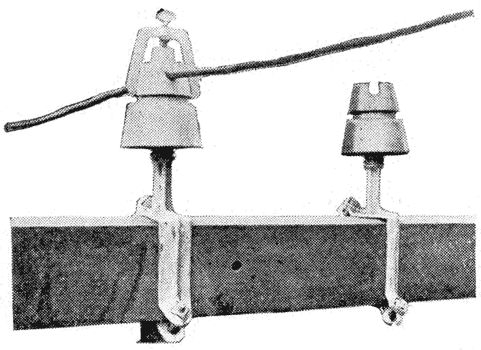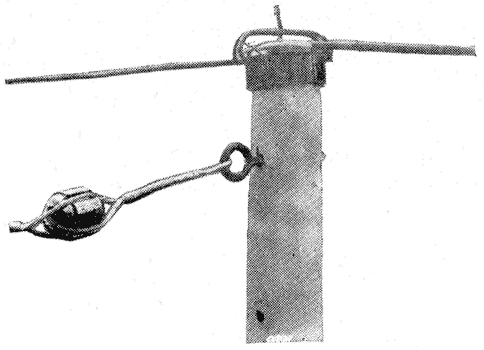[Trade Journal]
Publication: Electrical World
New York, NY, United States
vol. LV, no. 20, p. 1334, col. 1-2
CLAMP INSULATORS.
A novel type of insulator which altogether avoids the use of a tie-wire, which can be installed quickly and permanently, is the invention of a practical line-construction man in St. Louis. The varied troubles resulting from the use of the tie-wire are all too well known to those having the maintenance of overhead lines in charge. The breaking of spans due to corrosion at the tie-wire and to kinks caused by the linemen tieing the wires are probably the most frequent of these difficulties. Sometimes the swinging of the spans will loosen the tie-wires, causing the lines to drop down on the cross-arms. One of the most difficult troubles to locate is a break due to corrosion at the tie-wire, in which the conductor separates but is held in place by the twisted neck of the tie. The insulator offered to replace the present tied type of construction comprises, as shown in Fig. 1, a porcelain stool and petticoat of the usual form for pin mounting, but having cast across its top a deep slot for the wire or cable. This slot is nearly rectangular in cross-section, with its bottom sloping toward the center from each edge. At the center the slot widens to accommodate a round porcelain pin which clamps on the wire and is held firmly by a galvanized-iron bale and thumb screw, not dissimilar to those used on some fruit jars. The combination of the sloping slot and the pressure pin exerts a powerful grip on the wire, which is said to be sufficient to allow the line to be thus dead-ended by clamping without other hold. As the wire is carried at the very top of the insulator, the length of leakage path for the same over-all height of insulator is very much increased over that of the standard pattern, in which the charged line and tie-wires are not so far isolated from the pin. The reduced amount of material which is in this way required for the same voltage insulator is thus responsible, it is explained, for the lower cost of the clamp type described. The bale itself may be used over again, and in the case of serious rusting or destruction by oxidization of the screw, the latter can be replaced at a trifling cost, or, in fact, at an expense less than that for a tie-wire.
 |
| Fig. 1 - Clamp Insulator. |
A modification of the same principle is shown in Fig. 2, which illustrates a pole-top insulator designed to accommodate a single wire or trolley feeder, which is clamped into place as before. The insulator is so constructed as to be easily cemented over the top of the iron pole. The inventor of these devices, which many other experienced line-construction men have characterized as filling an important need in putting up wires of all kinds, is Mr. John L. Fay, general foreman of overhead line-construction of the Union Electric Light & Power Company, St. Louis, Mo.
 |
| Fig. 2 - Clamp Pole-Top Insulator. |
